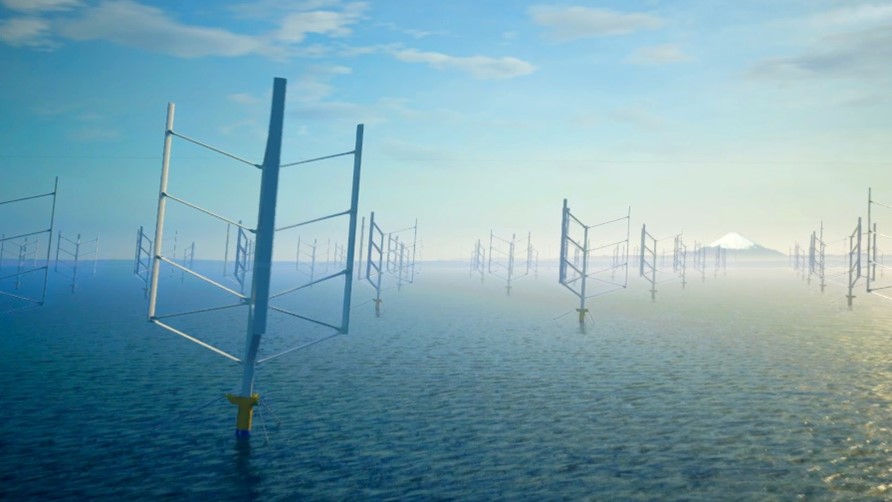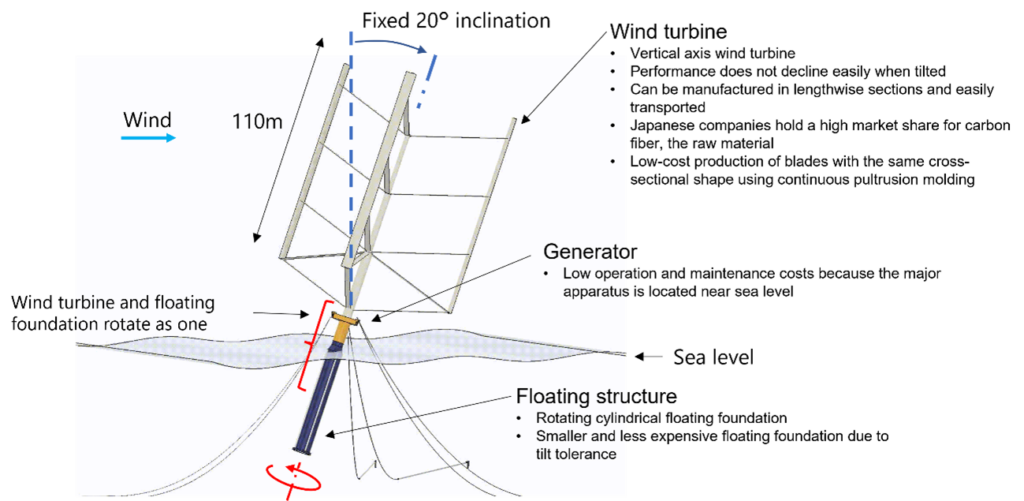Developing a Japanese-produced floating wind turbine to reduce the cost of offshore wind power
Electric Power Development Co., Ltd. (J-POWER),1 Tokyo Electric Power Company Holdings, Inc. (TEPCO HD),2 Chubu Electric Power Co., Inc. (Chubu Electric),3 Kawasaki Kisen Kaisha, Ltd. (“K” LINE),4 and Albatross Technology Inc. (Albatross),5 have entered into a joint research agreement for a next-generation (floating axis) offshore wind turbine demonstration project (the “project”).

(Courtesy of Albatross Technology Inc.)
The Japanese government has announced the intention to maximize the adoption of renewable energy sources as part of the nation’s commitment to achieving carbon neutrality by 2050. Offshore wind power, in particular, is considered a vital part of the initiative to make renewables a primary source of power due to the potential for large-scale installation, lower cost, and economic ripple effects. In Japan, with limited shallow sea areas, there is growing interest in floating offshore wind power because it can be deployed in deep water. To promote the widespread adoption, it is essential to significantly reduce costs through technological development. In addition, increasing the ratio of domestic production (in Japan) is expected to create a strong economic ripple effect.
Against this backdrop, the five partnering companies in this demonstration project will jointly develop a small-scale (20kW) next-generation experimental floating axis wind turbine that is expected to reduce costs and increase the domestic production ratio.
The floating axis wind turbine (FAWT) is a concept under which a vertical-axis wind turbine is supported by a “rotating” cylindrical floating foundation. Its main features are as follows:
Cost Reduction
- The wind turbine can be tilted 20 degrees at maximum output, as it is designed to maintain effectiveness even when tilted. This allows for downsizing for the floating foundation and a significant reduction in equipment costs.
- The wind turbine section can be manufactured at low cost through continuous pultrusion,6 a molding process used to form composite materials into long shapes, with carbon fiber reinforced plastics (CFRP).
- By taking advantage of the characteristics to install vertical axis wind turbines close to sea level due to their specific characteristics, operation and maintenance costs for the major apparatus are also anticipated to be substantially lower.
Increase in Domestic Production Ratio
- The wind turbine blades can be manufactured in lengthwise sections with the same cross-sectional shape, eliminating the need for large-scale manufacturing facilities. Additionally, this design makes sections easier to transport, and is therefore suited for domestic production.
- Japanese companies hold approximately 80% of the market share for carbon fiber, the raw material used in the carbon composite for the wind turbine.
J-POWER, Osaka University’s Graduate School of Engineering and Albatross are jointly conducting initial studies of the FAWT concept. Embarking on the tests signifies the next step under a new framework. For the project, small-scale experimental versions of the FAWT will be installed in Japanese waters. After confirming the validity of the analysis and design method, this will lead to an even larger scale (megawatt class) offshore demonstration project.
The five companies involved in the project will use their individual expertise to jointly develop the FAWT, which is anticipated to be a “game changer” in floating offshore wind power generation. Through this collaboration, we aim to make offshore wind power generation the primary source of electricity and contribute to the realization of a carbon-neutral society.
Goals of participating companies:
| J-POWER, TEPCO HD, Chubu Electric | To develop promising technologies for floating offshore wind power generation and increase the introduction of renewable energy, thereby contributing to the realization of a carbon-neutral society. |
| “K” LINE | As Japan’s Ship Safety Act applies to floating offshore wind turbines, “K” LINE will cooperate in the practical implementation of new floating offshore wind turbines by providing its expertise, and contribute to a decarbonized society by applying the knowledge gained from this research in activities for offshore wind support vessels in the future. |
| Albatross | To practically implement innovative floating offshore wind turbines and widely extend their use both in Japan and internationally. |
Cooperating Organizations
The wind turbine section of the small-scale experimental units will be developed by Fukui Fibertech Co., Ltd. (Aichi Prefecture), and the floating section will be developed by Mirai Ships Inc. (Miyagi Prefecture). The carbon composite material molding technology will be developed in partnership with the Innovative Composite Center (ICC) at the Kanazawa Institute of Technology, and the motion analysis technology will be developed in partnership with Osaka University’s Graduate School of Engineering.
Notes:
- Electric Power Development Co., Ltd. (headquartered in Chuo-ku, Tokyo; President: Toshifumi Watanabe)
- Tokyo Electric Power Company Holdings, Inc. (headquartered in Chiyoda-ku, Tokyo; President: Tomoaki Kobayakawa)
- Chubu Electric Power Co., Inc. (headquartered in Nagoya City, Aichi; President: Kingo Hayashi)
- Kawasaki Kisen Kaisha, Ltd. (headquartered in Chiyoda-ku, Tokyo; President: Yukikazu Myochin)
- Albatross Technology Inc. (headquartered in Chuo-ku, Tokyo; CEO: Hiromichi Akimoto)
- A molding method for continuously manufacturing components with the same (fixed) cross-section by solidifying the resin and fibers as they are drawn through a mold







